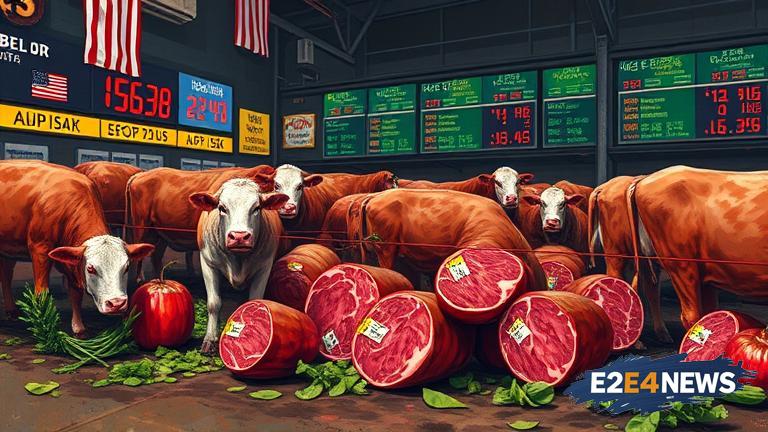The United States has witnessed a significant surge in beef prices, with the cost of beef reaching a record high. This increase has been attributed to various factors, including the ongoing pandemic, droughts, and supply chain disruptions. The livestock industry has been severely impacted, with farmers and ranchers facing challenges in maintaining their herds. The rising cost of feed, labor, and transportation has also contributed to the increase in beef prices. Furthermore, the demand for beef has remained high, driven by consumer preference for high-quality protein sources. The US Department of Agriculture (USDA) has reported that the average price of beef has increased by over 10% in the past year, with some cuts experiencing even higher price hikes. The impact of this trend is being felt across the country, with consumers facing higher prices at grocery stores and restaurants. The livestock industry is also experiencing a decline in profits, as the increased cost of production is not being fully passed on to consumers. In addition, the environmental impact of the livestock industry is a growing concern, with the production of beef being a significant contributor to greenhouse gas emissions. The use of antibiotics and hormones in beef production has also raised concerns about the health and safety of consumers. To address these issues, some farmers and ranchers are adopting sustainable and regenerative practices, such as rotational grazing and organic feed. These methods not only improve the environmental sustainability of beef production but also enhance the quality and nutritional value of the meat. However, the adoption of these practices is often more expensive and time-consuming, which can limit their widespread implementation. The US government has implemented policies to support the livestock industry, including subsidies and trade agreements. Nevertheless, the long-term sustainability of the industry remains a concern, with many experts advocating for a shift towards more plant-based diets. The rise of alternative protein sources, such as plant-based meat alternatives and lab-grown meat, is also expected to impact the beef industry. As consumers become more aware of the environmental and health impacts of their food choices, the demand for sustainable and ethical beef production is likely to increase. In response, some companies are investing in sustainable beef production and certification programs, such as the Certified Angus Beef (CAB) label. These initiatives aim to promote transparency and accountability in the beef industry, while also providing consumers with more informed choices. Despite these efforts, the beef industry faces significant challenges in the coming years, including the need to reduce its environmental footprint and improve its social and economic sustainability. The impact of the record-high beef prices will be felt across the US, with consumers, farmers, and ranchers all being affected. As the industry continues to evolve, it is likely that we will see a shift towards more sustainable and regenerative practices, as well as increased investment in alternative protein sources.
